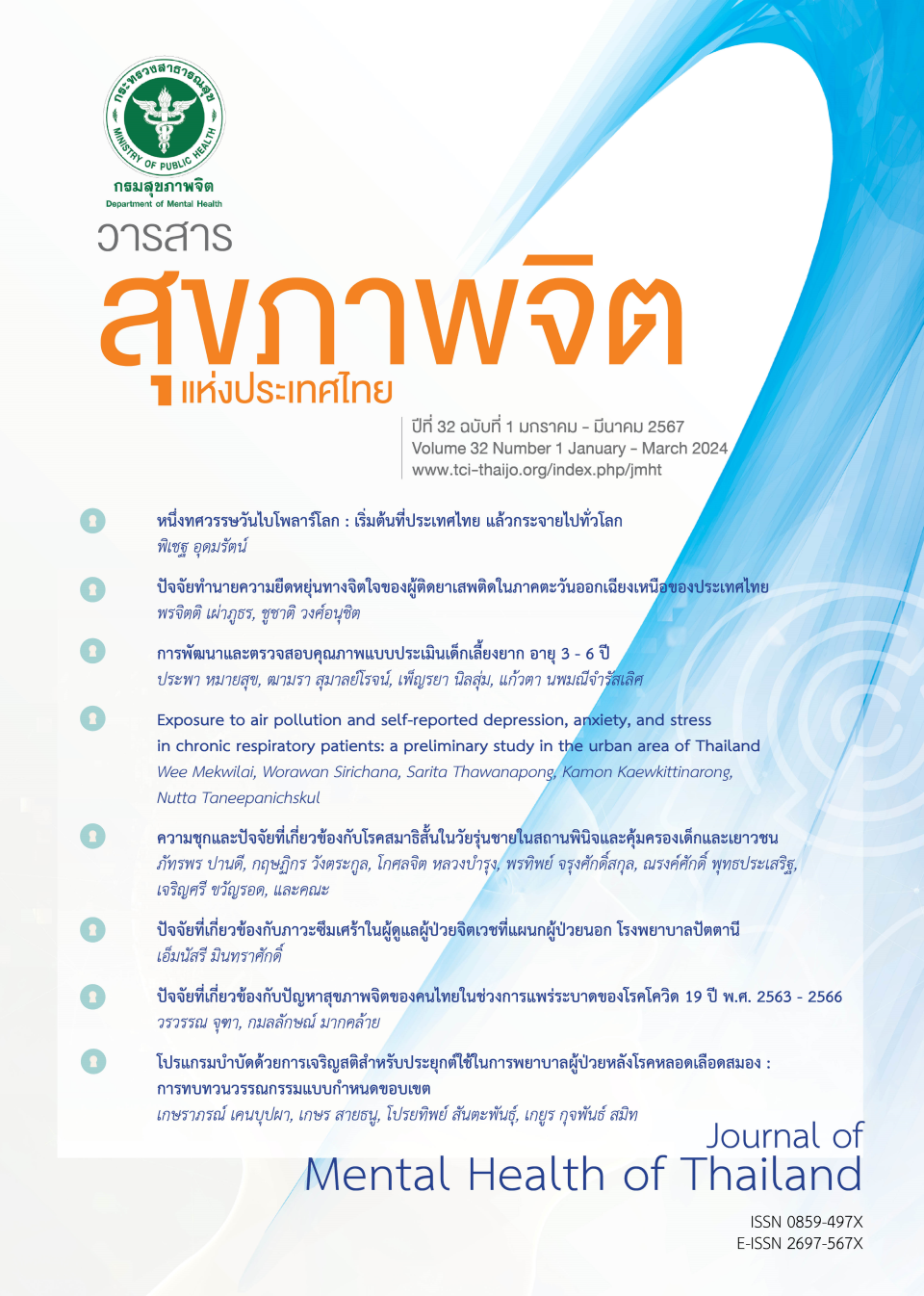ปัจจัยทำนายความยืดหยุ่นทางจิตใจของผู้ติดยาเสพติดในภาคตะวันออกเฉียงเหนือของประเทศไทย
คำสำคัญ:
การทำใจ, การรับรู้ว่าถูกตีตรา, ความตั้งใจในการเลิกยาเสพติด, ความภาคภูมิใจในตนเอง, ความยืดหยุ่นทางจิตใจบทคัดย่อ
วัตถุประสงค์ : เพื่อศึกษาปัจจัยทำนายความยืดหยุ่นทางจิตใจของผู้ติดยาเสพติด
วิธีการ : เก็บรวบรวมข้อมูลของผู้ติดยาเสพติด ณ แผนกผู้ป่วยใน โรงพยาบาลธัญญารักษ์ทุกแห่งในภาคตะวันออกเฉียงเหนือ ระหว่างเดือนมีนาคม ถึง ธันวาคม พ.ศ. 2565 แบบสอบถามประกอบด้วย แบบวัดการรับรู้ว่าถูกตีตราของการติดยาเสพติด แบบสอบถามความตั้งใจในการเลิกยาเสพติด แบบวัดความภาคภูมิใจในตนเองของโรเซนเบิร์ก แบบวัดกลยุทธ์การเผชิญปัญหาแบบไทย (การทำใจ) และแบบวัดความยืดหยุ่นทางจิตใจของผู้ติดยาเสพติด วิเคราะห์ข้อมูลโดยใช้สถิติเชิงบรรยาย ได้แก่ ค่าเฉลี่ย ร้อยละ และส่วนเบี่ยงเบนมาตรฐาน และสถิติอ้างอิง ได้แก่ สหสัมพันธ์ของเพียร์สันและการวิเคราะห์สมการถดถอยพหุคูณแบบเป็นขั้นตอน
ผล : กลุ่มตัวอย่าง 266 คน อายุเฉลี่ย 32.1 ปี (SD = 10.1) เป็นเพศชายร้อยละ 86.1 ใช้ยาบ้าเป็นยาเสพติดหลักร้อยละ 61.3 ปัจจัยที่มีความสัมพันธ์กับความยืดหยุ่นทางจิตใจอย่างมีนัยสำคัญทางสถิติ ได้แก่ การรับรู้ว่าถูกตีตรา (r = -.301, p < .01) ความตั้งใจในการเลิกยาเสพติด (r = .277, p < .01) ความภาคภูมิใจในตนเอง (r = .430, p < .01) และการทำใจ (r = .362, p < .01) โดยสามารถร่วมกันทำนายความแปรปรวนของความยืดหยุ่นทางจิตใจได้ร้อยละ 27.5 (R2 = .275)
สรุป : ผู้ติดยาเสพติดควรได้รับการบำบัดที่ลดการรับรู้ว่าถูกตีตราและเพิ่มความภาคภูมิใจในตนเอง ความตั้งใจในการเลิกยาเสพติด และกลยุทธ์การเผชิญปัญหาที่เหมาะสม เพื่อส่งเสริมความยืดหยุ่นทางจิตใจและลดการกลับไปใช้ยาเสพติดซ้ำ
Downloads
เอกสารอ้างอิง
American Psychiatric Association. Diagnostic and statistical manual of mental disorders: DSM-5™. 5th ed. Washington DC: American Psychiatric Publishing; 2013.
Kashefizadeh M, Taher M, Hosseinkhanzadeh A, Haj Aboutalebi N. The effecacy of motivational interview on intentional self-regulation, distress tolerance and psychological flexibility in men with substance abuse disorder undergoing maintenance therapy. Journal of Psychological Science. 2022;21(117):1815-32. doi:10.52547/JPS.21.117.1815.
Lee EB, An W, Levin ME, Twohig MP. An initial meta-analysis of acceptance and commitment therapy for treating substance use disorders. Drug Alcohol Depend. 2015;155:1-7. doi:10.1016/j.drugalcdep.2015.08.004.
National Institute on Drug Abuse. Comorbidity: addiction and other mental disorders [Internet]. Gaithersburg: National Institute on Drug Abuse; 2020 [cited 2023 May 12]. Available from: https://www.drugabuse.gov/publications/research-reports/common-comorbidities-substance-use-disorders/part-1-connection-between-substance-use-disorders-mental-illness
Svanberg G, Munck I, Levander M. Acceptance and commitment therapy for clients institutionalized for severe substance-use disorder: a pilot study. Subst Abuse Rehabil. 2017;8:45-51. doi:10.2147/SAR.S132255.
Hayes SC, Strosahl KD, Wilson KG. Acceptance and commitment therapy: the process and practice of mindful change. 2nd ed. New York: Guilford Press; 2012.
Haenjohn J. A development of acceptance and commitment training program on enhancing social problem solving of undergraduate students]. Journal of Education Burapha. 2014;25(3):98-112.
Mallik D, Kaplan J, Somohano V, Bergman A, Bowen S. Examining the role of craving, mindfulness, and psychological flexibility in a sample of individuals with substance use disorder. Subst Use Misuse. 2021;56(6):782-6. doi:10.1080/10826084.2021.1899220.
Marcowski P, Białaszek W, Dudek J, Ostaszewski P. Higher behavioral profile of mindfulness and psychological flexibility is related to reduced impulsivity in smokers, and reduced risk aversion regardless of smoking status. Polish Psychological Bulletin. 2017;48(4):445-55. doi:10.1515/ppb-2017-0051.
Slot M, Reijnders JSAM, Janssens M, Simons ME, Lataster JJE, Jacobs NE. Psychological Flexibility across the Lifespan in Dutch Adults: a cross-sectional study. PsyArXiv. 2022. doi:10.31234/osf.io/tzdqj.
Kukkola A, Mäyry A, Keinonen K, Lappalainen P, Tunkkari M, Kiuru N. The role of psychological flexibility and socioeconomic status in adolescent identity development. J Contextual Behav Sci. 2023;30:112-20. doi:10.1016/j.jcbs.2023.09.005.
Vatanasin D, Dallas JC. Factors predicting self-stigma among youths receiving substance abuse treatment. Pacific Rim Int J Nurs Res. 2022;26(1):78-89.
Krafft J, Ferrell J, Levin ME, Twohig MP. Psychological inflexibility and stigma: a meta-analytic review. J Contextual Behav Sci. 2017;7:15-28. doi:10.1016/j.jcbs.2017.11.002.
Detchaiyot P, Vatanasin D, Dallas JC. Factors predicting intention to quit substance abuse among youth receiving substance abuse treatment. Journal of Health Science Research. 2021;15(2):37-49.
Luoma JB, Drake CE, Kohlenberg BS, Hayes SC. Substance abuse and psychological flexibility: the development of a new measure. Addict Res Theory. 2011;19(1):3-13. doi:10.3109/16066359.2010.524956.
Tindle R, Hemi A, Moustafa AA. Social support, psychological flexibility and coping mediate the association between COVID-19 related stress exposure and psychological distress. Sci Rep. 2022;12(1):8688. doi:10.1038/s41598-022-12262-w.
Mills AC, Poogpan J, Wong-Anuchit C, Rujkorakarn D. The meaning of acceptance (Thum-jai) in Thai people: Letting it go…so life goes on. Int J Ment Health Nurs. 2019;28(4):879-87. doi:10.1111/inm.12587.
Mills AC, Wong-Anuchit C, Poogpan J, Rujkorakarn D. The Thum-jai (acceptance) scale: development and psychometric properties. Pacific Rim Int J Nurs Res. 2021;25(4):553-66.
Yamane T. Statistics: an introductory analysis. 3rd ed. New York: Harper and Row; 1973.
Wong-Anuchit C, Mills AC, Schneider JK, Rujkorakarn D, Kerdpongbunchote C, Panyayong B. Internalized stigma of mental illness scale - Thai version: translation and assessment of psychometric properties among psychiatric outpatients in central Thailand. Arch Psychiatr Nurs. 2016;30(4):450-6.
Ritsher JB, Phelan JC. Internalized stigma predicts erosion of morale among psychiatric outpatients. Psychiatry Res. 2004;129(3):257-65. doi:10.1016/j.psychres.2004.08.003.
Amnajkitikorn W. Sociopsychological factors and determination to quit drug addiction among individuals in a drug rehabilitation center in Chiang Mai. Chiang Mai: Viangbua Printing; 2010.
Ajzen I, Fishbein M. Understanding attitudes and prediction social behavior. Englewood Cliffs: Prentice-Hall; 1980.
Wongpakaran T, Wongpakaran N. A comparison of reliability and construct validity between the original and revised versions of the Rosenberg self-esteem scale. Psychiatry Investig. 2012;9(1):54-8. doi:10.4306/pi.2012.9.1.54.
Nunsoongnern S, Rodcumdee B, Suktrakul S. Selected factors related to perceived stigma patients with amphetamine dependence. Royal Thai Navy Medical Journal. 2019;46(1):1-17.
Dallas JC, Joulmet P, Dechchaiyos P, Khuninthong M, Boonchuam S, Sitanon T. Cultivating resilience in life and drug abstinence intention: perspectives of substance-abusing youths. The Journal of Faculty of Nursing Burapha University. 2021;29(3):29-40.
ดาวน์โหลด
เผยแพร่แล้ว
รูปแบบการอ้างอิง
ฉบับ
ประเภทบทความ
สัญญาอนุญาต
ลิขสิทธิ์ (c) 2024 วารสารสุขภาพจิตแห่งประเทศไทย

อนุญาตภายใต้เงื่อนไข Creative Commons Attribution-NonCommercial-NoDerivatives 4.0 International License.
- ผู้อ่านสามารถนำข้อความ ข้อมูล จากวารสารไปใช้ไปใช้ประโยชน์ทางวิชาการได้ เช่น เพื่อการสอน เพื่อการอ้างอิง แต่การนำไปใช้เพื่อวัตถุประสงค์อื่น เช่น เพื่อการค้า จะต้องได้รับอนุญาตเป็นลายลักษณ์อักษรจากกรมสุขภาพจิตก่อน
- ความคิดเห็น ข้อมูล และบทสรุปต่าง ๆ ที่ลงตีพิมพ์ในวารสารสุขภาพจิตแห่งประเทศไทยเป็นของผู้เขียนบทความและมิได้แสดงว่ากองบรรณาธิการหรือกรมสุขภาพจิตเห็นพ้องด้วย




